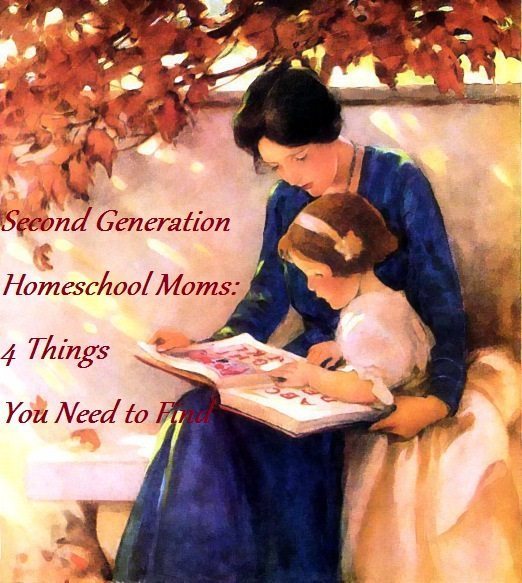Discipleship Curriculum – The 5 Most Important Things
“What if believers not only knew the path that God had mapped out for them, but also chose to walk in it? … That, in its simplest form, is what it means to be a disciple.” – Introduction, RVL Discipleship: The Curriculum.
If you’re a homeschooler, you know how important your children’s education is. At the top of the list, though, is their spiritual growth, their walk with God, and their discipleship.
This article discusses RVL Discipleship: The Curriculum extensively. We encourage you to try this curriculum out with the two free full samples available. Scroll to the bottom of this article for details.

From the time my kids were young, I gave them Bibles of every kind. The Beginner’s Bible, The Picture Bible, The Jesus Storybook Bible, just to name a few. Every time I went to a conference or browsed a bookstore, I’d find an interesting devotional. I collected so many kids’ devotionals and Bible studies they no longer fit on a single shelf.
The responsibility of our children’s discipleship and spiritual growth is a huge one and the truth is, it can be intimidating. By buying so many Bibles and devotionals and Word studies, I think I was trying to shore up against weaknesses in their spiritual defenses.
Guiding our kids on the path of discipleship isn’t easy. It’s not about tests they can pass or exams they can study for. Discipleship is a lifelong journey for children and parents alike. Encouraging their spiritual growth is the greatest responsibility we have as Christian parents, no matter what denomination we are a part of or what translation of the Bible we read.
Giving our children a well-rounded education is important; helping them know who they are in Christ and where they stand in God’s good plan for this world is essential.
So, how do we accomplish this? If it’s a lifelong journey, how can we at least give our kids a good start along that path while they are at home with us? When it comes to teaching children about discipleship, how do you know which resources are the best?
In short, they’re the ones that focus on the most important things. Here are some things to look for when you’re deciding on a Bible study or discipleship curriculum for your children, especially as they grow older and enter the middle and high school grades.

1: A good discipleship curriculum focuses on the most important thing.
“Hear O Israel! The Lord is our God, the Lord alone.
Love the Lord your God with all your heart,
all your soul, and all your might,
and love your neighbor as yourself.
Amen.” – Deuteronomy 6:4-5
Bible studies have to start somewhere, and often they’ll either begin with Genesis One (the Old Testament) or Matthew One (the New Testament). There are also Bible studies that focus on various books of the Bible.
The very best discipleship curricula will major on the majors. They will focus on the most important thing.
What is the most important thing?
Thankfully, we don’t have to debate that; we have the answer. When someone asked Jesus what the most important commandment was, he didn’t hesitate:
“The most important [commandment] is this: ‘Hear, O Israel: The Lord our God, the Lord is one. Love the Lord your God with all your heart and with all your soul and with all your mind and with all your strength.’ The second is this: ‘Love your neighbor as yourself.’ There is no commandment greater than these.” (Mark 12:29-31)
These are the two greatest commandments, and this is where RVL Discipleship: The Curriculum begins. This foundational statement is called the Shema, and in the very first lesson, Ray Vander Laan (RVL) launches into an expansive study of the Shema—what it meant for first-century Jews, what it means for Jewish people today, and what it means for Christians.
“In a world where there was intense pressure to compromise, the Shema became a way for God’s people to say plainly, ‘We will not serve any god except the Lord.’” Ray Vander Laan in RVL Discipleship: The Curriculum.
If you want a discipleship curriculum that focuses on the most important thing, the Shema is a good place to start. The fact that RVL Discipleship: The Curriculum makes the Shema a central focus throughout the entire study is perfect. In the beginning of every video, RVL and his class recite it both in Hebrew and in English, giving you and your kids the opportunity to stand and recite it along with them.
(By the time you’re several lessons in, you’ll be growing familiar with the Shema. Before long, you’ll likely have it memorized not only in English but in Hebrew as well. How awesome is that?)
2: An effective discipleship curriculum will provide the right context.
“For disciples of Jesus, it’s not enough to learn a list of things about God from the Bible. The Text was written by Eastern thinkers who wanted their audience to have a sensory, heart-centered chance to meet God.” – Ray Vander Laan in RVL Discipleship: The Curriculum
When I was a teenager, the Christian culture I was in focused on emotional aspects of faith, with songs and outreach and the idea of Jesus as “the God of love.” While these are important, they did not give me the best foundation for understanding Christianity, of history as God’s story, and of Jesus’ place in that overarching narrative.
As a young adult, I began to study theology and read helpful books that offered solid foundational context for my beliefs. The truth is, while Jesus came for all people, he came to earth in a particular time and to a particular place.
Jesus was a first-century Jew; he grew up saturated in the religious texts of that time. Understanding this context is vital to developing a healthy Christian worldview. This is another place where RVL Discipleship: The Curriculum checks the boxes.
In fact, that’s the primary focus of the discipleship course: to “consider what it meant to be a disciple of Jesus in a first-century Jewish context—and what it means for us today.”
This context is not just helpful, but it is so powerful in truly understanding the values, beliefs, and truths that the Jewish people of Jesus’ day held to. Orienting one’s perspective by learning about the Jewish world encourages homeschool parents and students to approach the Bible in a new way by carefully considering the context in which it was written and understanding the world that Jesus lived in. RVL Discipleship: The Curriculum encourages us to consider these categories as clues to help us understand the context: language, literature, geography, history, culture, and the grand narrative.
“Learning about the times and places in which the Bible was written can make all the difference in understanding how the original audience would have experienced these words—and how we should experience them today.” RVL Discipleship: The Curriculum

3: A great curriculum will encourage discussion and critical thinking.
“What would it have been like to be one of Jesus’ original disciples? And what does it mean to follow Him today?” – Ray Vander Laan in RVL Discipleship: The Curriculum
If you’re a homeschooling mom, I don’t have to tell you that the best curriculum does not merely teach your children the right answers. I’ve encountered textbooks in which students quickly learn to browse the questions and look specifically for the answers rather than engage with (and think critically about) the text.
This can be a problem when your child is learning science, but it’s particularly dangerous when it comes to discipleship and theology. Our kids’ understanding of scripture informs their worldview and what lenses they use to look at God, others, and themselves.
A good curriculum will encourage discussion and engagement. It will invite critical thinking rather than just looking for the answers and copying them down verbatim to get a passing grade. As a critical thinking course, RVL Discipleship: The Curriculum is founded on insightful, transformational videos and comes with a helpful instructor guide that facilitates your discussion with your children.
It is a terrific resource for homeschool parents to encourage their students to engage with the material. These discussion questions that accompany each video will enable you to have some great discussions with your older children and teenagers.
Honestly, it’s also a terrific tool to help you relate to each other in new ways. (Hint: You don’t have to have all the answers here.) Discipleship is a lifelong journey and we as parents have a long way to go as well. Sometimes it’s good for us to show our kids that we also are learning new things.
And I’m pretty sure that, when it comes to RVL Discipleship: The Curriculum, you will be learning plenty of new things, so talk about them together!
4: A robust discipleship curriculum will inspire your students to dig deeper.
“God not only instructs us through Scripture; He also uses it to reveal Himself. These stories are not meant to be simply instructional—they are meant to introduce us to the God who created everything.” – Ray Vander Laan in RVL Discipleship: The Curriculum
You know when your kids are tuned in and when they’re a million miles away in their head. Whether it’s while teaching them history or grammar—but especially teaching them about the Bible—you don’t want to see that blank look on your kids’ faces.
You want to know they’re interested.
This is what a good discipleship curriculum will do! It will stoke their curiosity to explore more on their own. It will fire up their desire to learn more about God, times, and places in the Bible—ultimately toward a goal of learning who God is, what he has done, and how they fit into the overarching narrative.
I have loved watching RVL’s videos. His stories and perspective wake up my mind and heart to reality, and I can see that on my kids’ faces. They’re engaged. They’re tracking.
For example, in the second lesson, RVL asks, “Why do you think the Bible is so full of stories?” He observes that God could have easily made the Bible a list of points about who God is, a list of points about what he has done, and it could have been a five-page document instead of 600 pages, primarily of stories.
RVL himself is a great storyteller, and he spends the next 25 minutes unpacking why this narrative choice and why it’s important. He discusses the difference between Western (or Greek) thinking and Eastern (or Hebrew) thinking when it comes to expressing information and how this approach informs our understanding of scripture.
I loved this lesson because stories are very important to me. As a writer of fiction and nonfiction, and an avid reader, I’ve delved into various approaches to storytelling and writing, and I appreciated seeing this perspective of the Hebrew approach to storytelling and the ideas of how it seeks to engage at a heart level.
This is precisely what I desire for my children as they grow, not just a list of information about God but deep understanding, a sensory experience that engages them at the level of the heart, introduces them to a God they can know, and invites them to explore more about this God.

5: A great discipleship curriculum will infuse your children with purpose.
“Through the presence of the Holy Spirit, we become His partners in bringing shalom to the broken world around us, making disciples of all nations until the day Jesus returns. This is what God has been up to since the beginning. This is the mission that weaves throughout and drives the entire story of the Bible. This is the mission—the story—we join.” RVL Discipleship: The Curriculum
Sometimes my kids get distracted and overly concerned about things that aren’t that important in the long run. One of them worries too much about grades. Another one spends more time than he should on screens. It’s easy for me to look at my children and critique their behavior.
In reality (and you can probably relate), it’s not just them. I often get distracted and overly concerned about things that really aren’t that important in the long run.
What I truly want is for my children to understand their identity in relation to Christ and what he has done. I want this understanding to fill them with a sense of purpose, to infuse them with a desire to perform the good works that God has prepared in advance for them.
A good Bible study or discipleship curriculum will help with this. In the Christian life, we all need reminders that orient us toward the truth, toward what really matters. We need resources that bring to mind the purpose for which we have been created. In RVL Discipleship: The Curriculum, a deep sense of purpose underlies every lesson
Whether it’s through insight as to why Abraham planted a tamarisk tree, background info on how shameful it is for a man in Hebrew culture to run, or a contemplation of why Jesus’ first miracle was turning water into wine, every discussion invites the students into a deeper understanding of scripture.
This study is not just about the head knowledge, but about infusing one’s heart, mind, and whole being with a sense of purpose by understanding this important truth by learning to approach the Bible from the context in which it was written, and identifying the grand narrative that ties the whole Bible together—the purpose to which God invites us to join.
More about “RVL Discipleship: The Curriculum”
Now let’s talk a bit more about RVL Discipleship: The Curriculum, which offers a unique and solid approach to understanding scripture from the Jewish perspective in which it was written.
About Ray Vander Laan (RVL)
Although it’s not one of the points mentioned above, it goes without saying that an effective discipleship curriculum will be taught by someone who knows what he’s talking about. This is definitely the case when it comes to Ray Vander Laan, or as he’s better known, RVL.
You know how some things change your life forever? Well, toward the end of his seminary education, RVL got the opportunity to study and travel in Israel. It wasn’t just a fun trip. It was transformational. As the curriculum intro explains:
“The Jewish methods of learning through experience—touching, tasting, smelling, seeing, walking, and climbing through the stories of the Bible—changed the course of his life forever. The experience led to his commitment to studying Scripture in light of its Jewish context, both in Israel and in the United States. RVL’s time in the Holy Land opened God’s Word to him like never before. He knew he wanted to spend the rest of his life helping people experience Scripture in the same way, by bringing the Bible to life for people around the world.“
For decades, he has accomplished this through video courses, while leading study tours throughout the lands of the Bible, and through teaching discipleship in the classroom.
RVL Discipleship: The Curriculum is “the culmination of RVL’s decades of dedicated study, focusing on the mission God gave to His people and how we are meant to live out that mission as His disciples. The class not only reveals the path God mapped out for His people, but it also challenges students to consider what it means to actually walk it out.”
Here is our review and experience with the Discipleship Curriculum:
About the Course
RVL Discipleship: The Curriculum is organized into four units. Each unit has 9 – 11 lessons (for a total of 40). These videos are about half an hour each. They move quickly and cover a lot of great material but are never overwhelming or boring. RVL engages his students with stories and continually returns to the heart of it all—Christ and the cross—informed from a fresh perspective grounded in the Jewish culture.
Accompanying the videos is an instructor guide (350 pages), and a student guide (325 pages, both of which can be downloaded.
The materials provided with the student guide include:
- Course Syllabus
- Forty video lessons from Bible teacher Ray Vander Laan
- Forty lesson guides, each of which corresponds to a video lesson. Each guide will include Introduction material to set up the video lessons, Guiding Questions for in-class discussion, a suggested Homework schedule, and Conclusion material to wrap up your class time.
- Homework assignments
- Glossary of key terms
- Map of the Holy Land
- “My Synoptic Gospel” worksheet
- Bibliography
You can unlock savings on RVL Discipleship: The Curriculum! from September 10th through November 30th, get this incredible homeschool resource for just $110—that’s $89 off the original retail price of $199.99 or an additional 15% off the current sale price of $129.99. Don’t miss this limited-time opportunity to enrich your kids’ discipleship journey at an exceptional value! Just use the code: TRISH
Download two free
Sample Lessons
The instructor guide has the same material, and in addition, has:
• Midterm/Final exams
This course can be offered for credit on an in-person or online basis, or taken independently by homeschoolers. The instructor guide has tips on using the curriculum specifically for homeschoolers, which is helpful.
In addition to the video and guides, the students are required to choose one of the synoptic Gospels (Matthew, Mark, or Luke) to study during the discipleship course. Sitting at the Feet of Rabbi Jesus by Ann Spangler and Lois Tverberg is also required reading. The book can be bought separately.
There is a suggested format for the class sessions, including:
- An opening
- Using the introduction from your instructor lesson guide to inform your setup of the video lesson, playing the video lesson for the day
- Using the guiding questions from the instructor guide to lead your kids in discussion and unpack the video lesson
- Utilizing the conclusion from the guide to wrap up
- Assigning homework from the homework section
It should take about an hour to complete a class, unless you and your kids are big on discussion. (There were days our discussions led into some great conversations about Bible history, connections between the Old and New Testament, typology, and more!) The instructor guide has additional text and helpful tips in blue to help you facilitate discussion with your homeschool class.
In Closing
As Christian homeschooling parents, we’ve taken on a big responsibility—that of raising our children in the nurture and admonition of the Lord. We are aiming to raise well-rounded children who are knowledgeable and proficient at the “head” level but also compassionate and wise at the “heart” level.
And TBH, we need all the help we can get. We need Bible studies and discipleship resources that:
- Focus on the most important things
- Provide the right context and orients toward the truth
- Encourage discussion and helpful discourse
- Inspire your student to dig deeper
- Infuse your children with purpose











